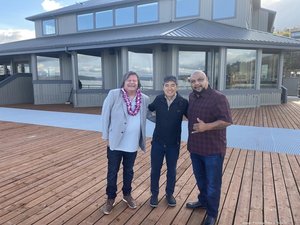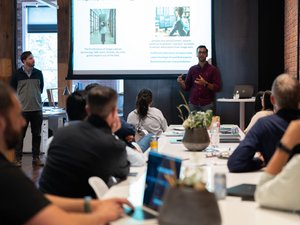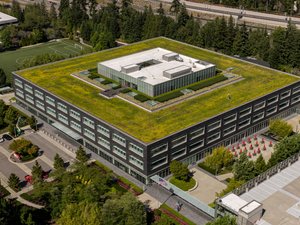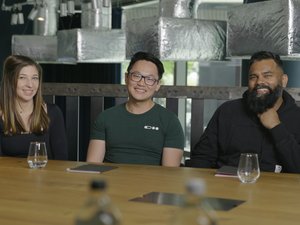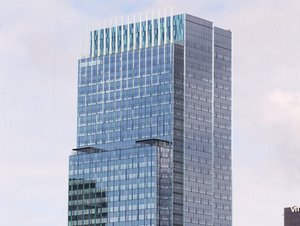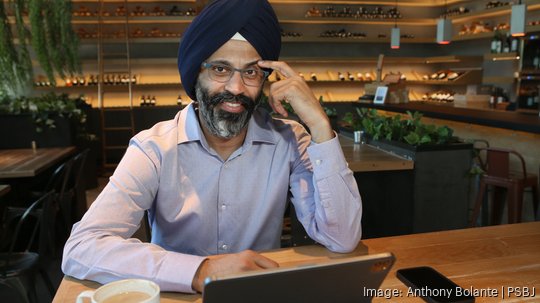
Tech has influenced Karandeep Anand from an early age.
“The fascination with computers was very early,” Anand said. “I started my career at Microsoft. I was deeply influenced and inspired by them when I was growing up. The reason I’m here is because Microsoft made computing accessible when I was in India.”
Anand joined Brex, a corporate card startup headquartered in San Francisco, in 2022, when the company raised $300 million and hit a value of $12.3 billion. He serves as president of the 7-year-old startup, but he has helped Brex move from just issuing cards to becoming more of a full-service fintech company.
In June, Brex confirmed it is opening an office in downtown Seattle. The company has more than 60 employees in the Seattle area, including Anand, and more than 200 in the Pacific Northwest. Brex is not yet disclosing details about the size or precise location of the office, or when exactly it will open. The company will remain remote-first and use the office for hybrid work.
The Business Journal spoke with Anand, who spent time at Microsoft and Meta before Brex, about his career, Brex’s Seattle plans and his penchant for meditation.
You spent about a decade in the Seattle area before moving to the Bay Area in 2015, but you moved back in 2021. Why?
More or less as a way to get Aiza, my daughter, exposed to Pacific Northwest life. ... It was the first time in her life, after being alive for two years, she saw rain. The Bay Area was in a drought for several years. It was worth it. That moment was magical.
Why did Brex want to open an office here?
The first expansion of Brex was more organic than anything else. People were like, “I want a place where I can enjoy nature and life and still have enough tech talent.” ... We found the core talent amazing. And being in the same time zone as SF is really helpful. It really helps to be in the same time zone that the rest of your company headquarters are. Last but not least, there are not a lot of consumer startups in the Seattle area, but there are a lot of amazing enterprise startups. We do hire a lot from other startups.
How big is the team going to get here?
We did a restructuring earlier this year, so we want to run pretty lean. Our goal is not to add a lot of people as much as doubling down on the density of talent. So in terms of number growth, it’s probably not going to be particularly larger. But increasingly, when we look to backfill roles, tapping into Seattle talent really helps.
About Karandeep
- Age: 44
- Hometown: Delhi
- Residence: Bellevue
- Education: Bachelor’s in computer science from the International Institute of Information Technology Hyderabad
A day in the life
We asked Karandeep to break down his workday:
- 6:30 a.m.: Start the day with meditation to Sikh hymns
- 7 a.m.: Transition into real life by making coffee for my 5-year-old daughter and tea for myself.
- 8:45 a.m.: Daily standup
- 9 a.m.-noon: Meetings
- Noon: Walk to lunch with customers or partners; "Feedback tastes better with fries."
- 4:30 p.m.: Meet with "my most trusted crew" to review and discuss priorities
- 7:30 p.m.: "From feeding my daughter to calling family in India, to doing the dishes — this is personal time."
You worked at Microsoft and Meta before Brex. How was the transition to a startup?
The harder transition was probably Microsoft to Meta, to be honest. Meta kind of prepared me for the Brex transition a little bit better because of how Meta operated. Even when Meta went from 6,000 to roughly 30,000 or 40,000 people, it still felt like a startup. It was still small teams and fast-paced.
Brex was founded by two Stanford students who dropped out to launch the company. Is it strange working for two wunderkind co-founders?
Very similar to working with Mark (Zuckerberg).
How so?
With Mark, you could see the intensity of a founder. In a lot of ways, (Brex co-founders) Pedro (Franceschi) and Henrique (Dubugras) are very similar. Very “dream big.” Very high intensity. Very strong opinions. Luckily not strong heads, which really helps. In terms of a founder-led company, it feels a lot like Meta.
You’ve worked for one of the largest software companies in the world, one of the largest consumer-facing apps in the world and now a growing fintech startup. What else is on your list?
When I do leave fintech, I’ll probably do something on the climate tech side.
Why climate tech?
I have a 5-year-old, and I’m pretty convinced that we’re not leaving a better world than we found it. ... No amount of money or legacy I leave for her is going to be useful if there’s no planet left. I am seriously worried about the problem. I wish more people would talk about it.
What is one thing most people don’t know about you?
I thrive mostly on meditation. People always ask me what do you do? Do you go running? Do you go play? Do you do other fun stuff? The No. 1 thing is that I get my energy from meditation.
How long do you meditate each day?
This morning was 40-ish minutes. There are days when it’s a lot longer.
Do you do it with other people or on your own?
Almost always on my own because I find it to be a very personal experience. But initially when some people want help, or to get started, I do help them.
This interview has been edited for length and clarity.
